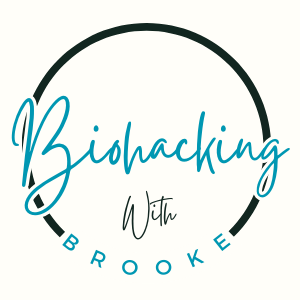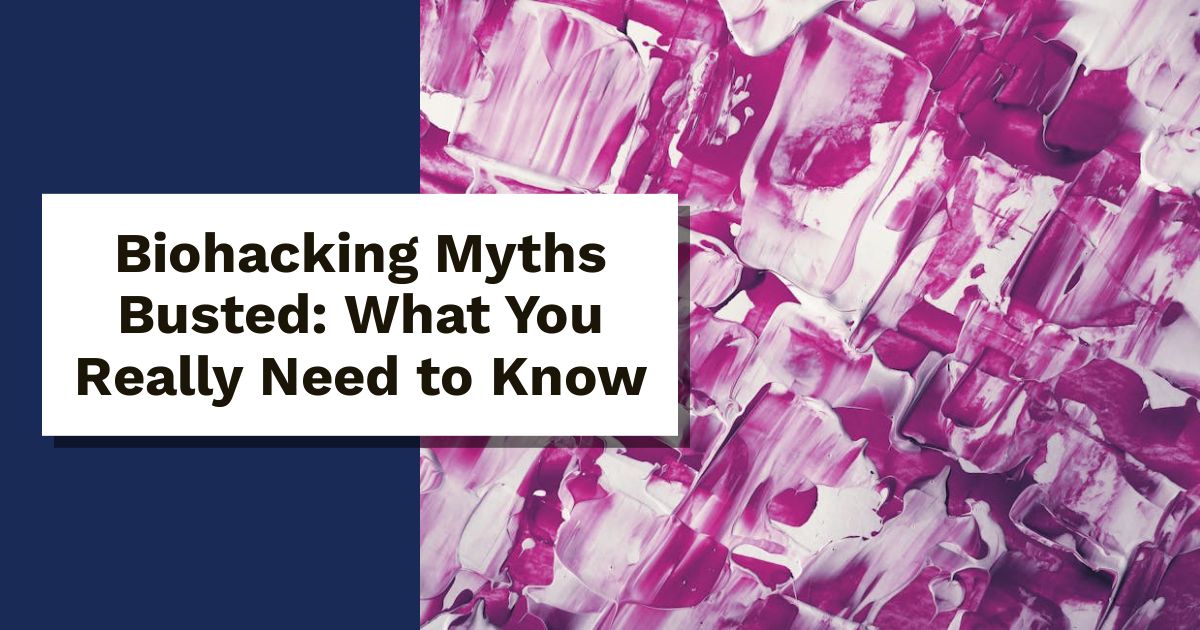Ever wondered what biohacking really is? Many people think it’s all about fancy gadgets or extreme diets. But that’s just the tip of the iceberg.
In this post, we’ll bust some common myths about biohacking and shed light on what it truly means. You’ll discover that biohacking isn’t reserved for tech geniuses or fitness gurus. It’s about understanding your body and making simple tweaks to enhance your well-being.
Get ready to separate fact from fiction. Whether you’re a biohacking newbie or a seasoned DIY enthusiast, there’s something here for you. Let’s dive in and uncover the truths behind the buzz!
What Is Biohacking?
Biohacking is the art and science of making simple changes to your lifestyle to enhance your health and well-being. It’s about taking control of your biology through intentional practices. Imagine it as a DIY project for your body; you’re finding ways to optimize how you feel, think, and perform daily. From adjusting your diet to using technology, biohacking offers tools for self-improvement that anyone can try.
The Basics of Biohacking
At its core, biohacking combines self-experimentation and science to find what works best for each individual. It attracts people seeking better mental clarity, more energy, or even a little extra longevity.
Here are some practical examples of biohacking:
- Diet Tweaks: Incorporating more whole foods and reducing processed sugars can lead to increased energy levels.
- Intermittent Fasting: Skipping meals for a period improves metabolism and promotes weight loss.
- Tracking Sleep Patterns: Using apps to monitor sleep helps optimize rest and recovery.
- Cold Showers: A chilly rinse can boost circulation and improve mood.
You can read more about what biohacking is and explore some hacks to get started at Medical News Today.
Popular Types of Biohacking
Biohacking isn’t a one-size-fits-all approach; many methods cater to different interests and goals. Here are a few popular types:
- DIY Biology: Individuals conduct experiments at home, exploring genetics or microbiology. They often look for ways to enhance health or creativity.
- Nutrigenomics: This focuses on how food interacts with your genes. It encourages people to choose foods that support their genetic makeup for optimal health.
- Grinders: A bit more extreme, grinders implant devices or technology into their bodies. This can involve anything from RFID chips to bio-sensors that track health metrics in real-time.
These methods embody the spirit of biohacking, allowing you to explore personal health transformations in various ways. For more in-depth insights into different types of biohacking, check out Healthline.
Whether you’re into simple diet changes or high-tech implants, there’s a form of biohacking that can suit your goals and lifestyle. Embrace the experimentation and find what benefits you the most!
Common Myths About Biohacking
Biohacking is often shrouded in misconceptions that can discourage people from exploring its benefits. Let’s clear the air by busting some of the most common myths surrounding this intriguing practice.
Myth 1: Biohacking is Dangerous
One of the biggest fears about biohacking is safety. Many think it involves risky procedures or extreme measures. The truth is, while biohacking can include such methods, most popular hacks focus on simple lifestyle tweaks that are safe to try.
Biohackers often prioritize safety by:
- Researching Evidence: Many popular hacks are backed by scientific research. Before trying something new, biohackers look for studies that support the method.
- Using Tracking Tools: Gadgets like fitness trackers and health apps allow individuals to monitor their body’s responses. This way, they can make informed adjustments.
- Starting Small: Most biohacks begin with small changes—like altering diet or sleep schedules—making them low-risk.
By following these practices, biohackers engage in self-experimentation while keeping health a top priority. You can read more on Healthline.
Myth 2: It Requires Expensive Equipment
Another common myth is that biohacking is an expensive hobby. Many assume you need high-tech gadgets or pricey supplements to participate. However, countless biohacks are surprisingly budget-friendly or even free.
Consider these low-cost biohacks anyone can try:
- Intermittent Fasting: This approach involves cycling between eating and fasting windows—no special equipment needed.
- Mindfulness and Meditation: Practicing mindfulness can enhance mental clarity and reduce stress, requiring nothing but your time and focus.
- DIY Health Tracks: Using a notebook or free apps to log your daily diet and mood can uncover patterns and areas for improvement.
With creativity and resourcefulness, biohacking can be accessible to everyone. Explore more ways to hack your life with budget-friendly options at Medical News Today.
Myth 3: Only Scientists Can Biohack
Many assume that biohacking is reserved for scientists or medical professionals. This myth is simply not true! Biohacking is for anyone interested in enhancing their well-being, regardless of their background.
You don’t need a PhD to start biohacking; here’s how you can begin:
- Educate Yourself: Read articles, watch videos, or listen to podcasts about biohacking. Knowledge is power!
- Join Communities: Engaging with online forums or local groups can help you connect with fellow biohackers. Sharing experiences and tips can fuel your journey.
- Experiment with Basics: Start with simple changes—like walking more or drinking more water. Over time, you can explore advanced techniques.
Biohacking is all about personal exploration. With determination and curiosity, anyone can embark on this journey. Discover more about how you can start at Integrative.
The Science Behind Biohacking
Understanding the science behind biohacking helps to reveal the truth behind the hype. Rather than relying solely on trends, we can look at the empirical evidence supporting popular practices. This section focuses on two key areas of interest: nutrition and supplements, as well as sleep and recovery techniques.
Nutrition and Supplements
Diet is a cornerstone of biohacking. Numerous claims surround different dietary supplements and their effects on health. For many, the journey starts with adjusting what they eat or adding specific supplements. Research suggests that some supplements may indeed enhance cognitive function and overall well-being.
Here are several popular biohacking supplements and their potential effects:
- Omega-3 Fatty Acids: Known for their anti-inflammatory properties, omega-3s may improve heart health and support brain function.
- L-Theanine: Often found in tea, this amino acid could boost cognitive performance while promoting relaxation without drowsiness.
- Creatine: It’s not just for bodybuilders. Creatine may improve memory and cognitive processing, making it a go-to supplement for mental clarity.
A thorough examination of the evidence shows that while some claims lack rigorous backing, others are supported by strong research. For more on specific supplements to consider, visit Life Extension. Understanding the role of nutrients in our bodies can help us make informed decisions about what to consume.
Sleep and Recovery Techniques
People often overlook the importance of sleep in biohacking. Sleep is essential for recovery, mental clarity, and overall health. Many sleep hacks claim to enhance rest quality and improve next-day performance, but how effective are they really?
Some commonly discussed techniques include:
- Creating a Consistent Sleep Schedule: Going to bed and waking up at the same time daily regulates your internal clock.
- Optimizing Sleep Environments: A cool, dark, and quiet room can significantly improve sleep quality.
- Mindfulness and Meditation: Incorporating mindfulness practices before bed can reduce stress, leading to better rest.
Studies reveal that good sleep hygiene, such as maintaining a regular schedule and creating a restful environment, can lead to improved sleep quality. If you’re interested in actionable strategies to enhance your sleep, check out Better Way Health.
Are you curious about how tweaking your sleep habits could boost your productivity? Engaging in these practices may lead to better focus and energy levels throughout the day. Biohacking isn’t just about what you consume; it’s also about how you rest and recover effectively.
Practical Biohacks You Can Try
Biohacking doesn’t have to be complicated or expensive. With a few simple changes, you can enhance your health and well-being. Here are some straightforward strategies you can incorporate into your daily routine.
Simple Diet Changes
Small adjustments to your diet can lead to big results. These tweaks are easy to implement and can significantly improve your overall health. Here are some practical ideas:
- Swap Sugary Drinks: Replace sodas and juices with sparkling water for a refreshing change. This simple switch cuts calories and sugar intake.
- Increase Whole Foods: Fill your plate with fruits, vegetables, and whole grains. These foods are rich in nutrients and will keep you full longer.
- Plan Meatless Meals: Choose plant-based proteins like beans or lentils a few times a week. This helps reduce saturated fat while increasing fiber. You can find more tips on healthy eating at NHS.
- Mind Portion Sizes: Allow your stomach to dictate how much you eat. Listening to your body can prevent overeating.
- Incorporate Healthy Snacks: Keep nuts, fruits, or yogurt on hand. This way, you’ll have nutritious options ready when hunger strikes.
For more detailed diet changes that can make a difference, check out this guide on Healthline.
Mindfulness Practices
Mindfulness can significantly improve your mental well-being. Here are some quick techniques to get you started:
- Breathing Exercises: Take a few minutes to focus on your breath. Inhale deeply through your nose, hold for a moment, then exhale slowly through your mouth.
- Gratitude Journaling: Spend a few minutes each day writing down what you’re grateful for. This can shift your mindset and reduce stress.
- Guided Meditation: Look for free apps or online videos for guided meditation. This practice can help calm your mind and ease anxiety. You can learn more about mindfulness exercises from Mayo Clinic.
- Mindful Walks: Take a short walk outside and focus on your surroundings. Notice the colors, sounds, and smells around you.
Engaging in mindfulness regularly can help you feel more centered and calm. If you’d like to explore more mindfulness activities, visit Healthline.
Fitness Hacks
Staying active is crucial, even with a busy schedule. Here are some fun and easy exercise hacks you can use:
- Dance It Out: Turn up your favorite tunes and dance like nobody’s watching. It’s a great way to get your heart pumping without it feeling like a chore.
- Sneaky Workouts: While waiting for your coffee or cooking, do calf raises or squats. Every little bit counts!
- Walk Meetings: Take your next call or meeting while walking. It keeps you moving and helps you think more clearly.
- Set a Timer: Use the Pomodoro technique for work. After every 25 minutes of work, take a 5-minute break to stretch or move around. Want more ideas for fitting exercise into your life? Check this out: Heart.org.
These biohacks are all about making simple changes that fit into your lifestyle. By gradually implementing these tips, you’ll likely notice improvements in your health and happiness. Happy biohacking!
Final Thoughts on Biohacking Myths
As we peel back the layers of biohacking, it’s essential to recognize the myths that often cloud this intriguing practice. Understanding these misconceptions can empower you to approach biohacking more wisely and effectively.
Myth 1: Biohacking is Just a Fad
Many people think biohacking will fade like last year’s fitness craze. In reality, biohacking is grounded in scientific principles. While trends may come and go, the core idea of optimizing health through tailored practices remains relevant. Research supports many biohacks, making them more than just fleeting trends. For insights on the lasting impact of biohacking, check out Medical News Today.
Myth 2: All Biohacks Work for Everyone
This misconception leads many to believe that one-size-fits-all solutions exist in biohacking. However, everyone’s body reacts differently to changes. What works wonders for one person might not yield the same results for another. This individuality is a key reason that biohacking encourages self-experimentation and personal reflection. Tailoring your approach based on your unique needs is crucial for success.
Myth 3: Biohacking is Exclusively for the Tech-Savvy
It’s easy to assume biohacking is reserved for tech geeks or scientists. This couldn’t be further from the truth. Anyone can engage in biohacking, regardless of their background. The beauty of biohacking lies in its accessibility; you don’t need a lab to start! Simple changes like tweaking your diet or incorporating mindfulness can yield significant benefits. Explore beginner-friendly biohacks at Integrative.
Myth 4: Biohacking is Unregulated and Dangerous
While some forms of biohacking do raise concerns over safety, many practices are risk-free and beneficial. By prioritizing evidence-based methods and sticking to safe self-experimentation, you can minimize risks. As always, your health should come first, and cautious experimentation is key. Learn more about navigating safety in biohacking from industry experts here.
The Path Forward
Recognizing these myths allows you to approach biohacking with open eyes and a ready mind. It’s about finding what works for you, experimenting with care, and enjoying the journey. Dive into this world of optimization, but remember, it’s essential to prioritize your safety and well-being above all. Curious about what biohacking could do for you? Start exploring the facts and uncovering the myths with the resources provided!
Conclusion
Biohacking is more than just myths and hype. It’s about personal insights and practical changes that anyone can make. Recognizing the truths behind biohacking empowers you to take charge of your health.
Ready to start your own journey? Experiment with small changes and see what fits your lifestyle.
What biohacks have you tried? Share your thoughts and experiences in the comments below!
Brooke is a rock-climbing 🧗♀️, tennis-playing 🎾, biohacking 🧬 bookworm 📚 on a mission to unlock the secrets of health, longevity, and living life to the fullest 🌟. When she’s not scaling cliffs, hitting the courts, or testing out the latest hacks, you’ll find her nose in a book or adventuring with her four-legged best friend 🐕 by her side. With a knack for turning science into simple, actionable tips, Brooke’s writing is your guide to hacking your biology and living your best, most vibrant life!


